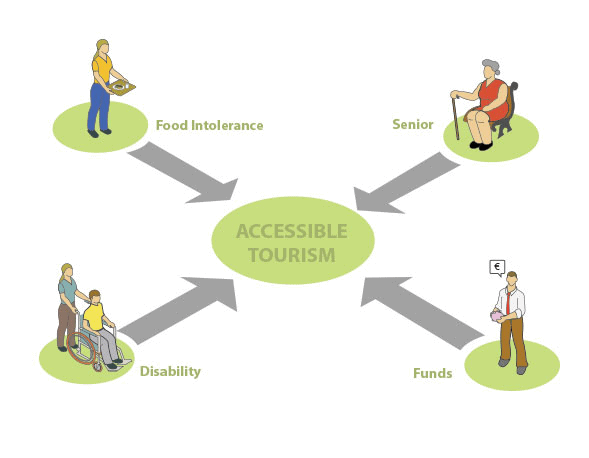Accessible Healthcare Tourism: Ensuring Inclusivity And Accommodations

Are you someone who loves to travel but often finds yourself hesitant due to accessibility concerns when it comes to healthcare? Do you worry that your disability may hinder your ability to explore new destinations and receive the medical care you need? If so, know that you are not alone.
Accessible healthcare tourism is an essential aspect of ensuring that all travelers, regardless of their physical abilities, can enjoy the benefits of exploring new destinations while also receiving the necessary medical care they require.
In this article, we will discuss the importance of accessibility in healthcare tourism and how it can be achieved through investing in infrastructure and equipment, training staff on disability awareness and sensitivity, providing personalized accommodations for travelers with disabilities, and collaborating with local communities for inclusivity. We will also address language and communication barriers and ensure safe and comfortable travel for all.
By the end of this article, you will have a better understanding of how accessible healthcare tourism can benefit you and how it can be achieved through collaboration and awareness.
Key Takeaways
- Accessible healthcare tourism is crucial for ensuring equal opportunities for all individuals to access healthcare services and facilities while traveling.
- Travelers with disabilities have specific needs that include audio descriptions, wheelchair accessibility, and assistance with transfers, among others.
- Investment in infrastructure and equipment that caters to the needs of travelers with disabilities, training staff on disability awareness and sensitivity, and providing personalized accommodations are crucial for accessible healthcare tourism.
- Collaboration with local communities, addressing language and communication barriers, prioritizing safety and comfort, and implementing universal design principles in healthcare facilities and tourism infrastructure are essential for ensuring accessible healthcare tourism and promoting its growth.
The Importance of Accessibility in Healthcare Tourism
You might not realize it, but ensuring accessibility in healthcare tourism is crucial for everyone to have a chance to benefit from it. Accessibility refers to the ability of people with disabilities or other special needs to access healthcare services and facilities.
Without accessibility, healthcare tourism may become exclusive and only available to a specific group of people, leaving out others who could benefit from it. Accessible healthcare tourism means that everyone, regardless of their physical or mental condition, has an equal opportunity to access healthcare services and facilities.
This includes accessible transportation, accommodation, and medical facilities. By ensuring accessibility, healthcare tourism can become an inclusive industry that caters to all people, regardless of their needs.
It’s crucial to prioritize accessibility in healthcare tourism to ensure that everyone has the opportunity to access quality healthcare services and facilities.
Understanding the Needs of Travelers with Disabilities
Imagine exploring a foreign country, and suddenly, you encounter an obstacle that prevents you from accessing a popular tourist attraction. For travelers with disabilities, this is a common occurrence that can quickly ruin a trip. Understanding the needs of these travelers is crucial to ensuring that healthcare tourism is accessible to all.
Travelers with disabilities have a variety of needs, depending on their specific disability. For example, a person with a visual impairment may require audio descriptions or braille signage, while someone with a mobility impairment may need wheelchair accessibility and assistance with transfers.
It’s important for healthcare tourism providers to understand these needs and make accommodations to ensure that all travelers, regardless of ability, can access healthcare services. This not only promotes inclusivity but also helps to create a positive experience for the traveler.
Investing in Accessible Infrastructure and Equipment
Investing in infrastructure and equipment that caters to the needs of travelers with disabilities can truly transform their experience and make healthcare tourism a more welcoming industry. Ensuring that facilities and equipment are accessible to all can make a huge difference in the quality of care received by travelers with disabilities.
For instance, installing ramps and elevators in healthcare facilities can make it easier for those with mobility challenges to navigate the premises. Additionally, providing accessible medical equipment and devices such as hearing aids and braille signage can make it easier for travelers with disabilities to access and understand medical information.
Not only does investing in accessible infrastructure and equipment benefit travelers with disabilities, but it also benefits healthcare tourism providers. By catering to the needs of travelers with disabilities, providers can expand their market and attract more customers. Moreover, accessible infrastructure and equipment can improve the overall reputation of the healthcare tourism industry, making it a more inclusive and welcoming sector.
As such, investing in accessible infrastructure and equipment is a win-win situation for both travelers with disabilities and healthcare tourism providers.
Training Staff on Disability Awareness and Sensitivity
By educating staff on disability awareness and sensitivity, they can better understand the needs of travelers with disabilities and provide them with high-quality care. This can include training on how to communicate with individuals who may have difficulty speaking or hearing, understanding how to assist travelers with mobility devices, and recognizing the importance of respecting personal space and privacy.
Here are three reasons why training staff on disability awareness and sensitivity is crucial in accessible healthcare tourism:
- It shows that your organization values diversity and inclusivity, making travelers with disabilities feel welcomed and valued.
- It helps staff recognize and address potential barriers that may prevent travelers with disabilities from accessing healthcare services.
- It can lead to improved patient outcomes and satisfaction, as staff are better equipped to provide individualized care that meets the unique needs of each traveler.
Providing Personalized Accommodations for Travelers with Disabilities
You can make a positive impact on travelers with disabilities by tailoring your services to meet their individual needs, leaving a lasting impression of care and consideration.
Providing personalized accommodations is a crucial part of accessible healthcare tourism. Some accommodations may include wheelchair accessible rooms, bathroom grab bars, shower chairs, and adjustable beds. These accommodations will allow travelers with disabilities to have a comfortable stay and enjoy their trip without any worries.
In addition, it’s important to have staff trained in providing these accommodations and assisting travelers with disabilities. Staff should be knowledgeable about the various types of disabilities and their specific needs. They should also be able to communicate effectively and respectfully with travelers with disabilities.
By providing personalized accommodations and trained staff, you can ensure that travelers with disabilities feel welcomed and valued. This, in turn, will make them more likely to return or recommend your services to others.
Collaborating with Local Communities for Inclusivity
Collaborating with local communities can greatly enhance the travel experience for individuals with disabilities. When planning your healthcare tourism trip, consider reaching out to local organizations or community groups that focus on disability advocacy. These groups can provide valuable insights into the accessibility of tourist attractions and accommodations in the area, as well as offer recommendations for accessible transportation options.
As you collaborate with local communities, keep in mind that inclusivity should be a shared responsibility. Encourage businesses and tourist destinations to improve accessibility by providing feedback and suggestions for accommodations.
Additionally, consider participating in local disability advocacy events or volunteering with organizations that promote inclusivity. By working together with local communities, you can help ensure that healthcare tourism is accessible and enjoyable for all travelers.
Addressing Language and Communication Barriers
Overcoming language and communication barriers is essential for a successful travel experience, especially for individuals with disabilities. It can be challenging to navigate a foreign country, find your way around, and communicate your needs without speaking the local language. This is why healthcare tourism providers need to be aware of these challenges and provide language and communication support to their clients.
One way to address language and communication barriers is by hiring local translators or interpreters. These professionals can accompany clients during appointments, help them communicate their needs to healthcare providers, and assist them in navigating the local area.
Additionally, healthcare tourism providers can offer language classes or provide translation services for important documents such as medical records or insurance information. By addressing language barriers, healthcare tourism can become more inclusive and accessible to individuals with disabilities, ultimately improving their travel experience.
Ensuring Safe and Comfortable Travel for All
When traveling with disabilities, it’s important to prioritize safety and comfort to ensure a stress-free and enjoyable experience. This means taking extra precautions during transportation, such as booking wheelchair-accessible vehicles and requesting assistance with luggage. It also means choosing accommodations that cater to your specific needs, whether that be a room equipped with grab bars and a shower chair or a hotel with a fully accessible gym.
To help you plan your accessible healthcare tourism trip, here’s a table outlining some important considerations:
| Category | Considerations | Resources | ||||
|---|---|---|---|---|---|---|
| Transportation | Wheelchair-accessible vehicles, assistance with luggage, accessible parking | Accessible Journeys, Wheelchair Travel | ||||
| Accommodations | Accessible rooms, grab bars, shower chairs, accessible gyms | AccessibleGO, Airbnb | ||||
| Activities | Accessible tours, museums, and attractions | Sage Traveling, Accessible Travel Online | ||||
| Medical Needs | Accessible medical facilities, medical equipment rentals, accessible pharmacies | Disabled Travelers, Handiscover | ||||
| Legal Rights | Disability rights laws, accessibility regulations, discrimination protections | ADA National Network, Disability Rights Education and Defense Fund | Transportation | Accessible transportation options, wheelchair accessible taxis, accessible public transportation | Mobility International USA, Accessible Travel Solutions |
The Future of Accessible Healthcare Tourism
Now that you’ve learned how to ensure safe and comfortable travel for all, let’s take a look at the future of accessible healthcare tourism.
As more and more people seek medical treatments abroad, it’s essential to make sure that everyone can access these services, regardless of their physical abilities or disabilities. One way to achieve this is through the implementation of universal design principles in healthcare facilities and tourism infrastructure.
This means creating environments that are accessible and inclusive for everyone, regardless of their age, mobility, or sensory abilities. From wheelchair ramps and accessible bathrooms to audio and visual aids, universal design can help ensure that everyone can access healthcare services and enjoy tourism experiences without barriers.
Moreover, it can also benefit local communities by making their infrastructure more accessible and accommodating for everyone. As healthcare tourism continues to grow, it’s essential to prioritize inclusivity and accommodations to ensure that everyone can benefit from these services.
Frequently Asked Questions
Are there any legal requirements for healthcare facilities to provide accessible services for travelers with disabilities?
Legal requirements mandate healthcare facilities to provide accessible services for travelers with disabilities. You must ensure accessibility for individuals with visual, hearing, and mobility impairments. Failure to comply with legal standards can lead to legal repercussions.
How can healthcare tourism providers ensure that their accommodations meet the specific needs of travelers with disabilities?
To ensure that accommodations meet the specific needs of travelers with disabilities, you can start by conducting accessibility assessments, providing accessible transportation, offering staff training, and partnering with local disability organizations to gather feedback and improve services.
What resources are available for travelers with disabilities who require specialized medical care while abroad?
If you require specialized medical care abroad, research healthcare facilities that offer accessible accommodations and services. Check with your insurance provider for coverage and consider consulting with a travel agent who specializes in disability travel.
How can healthcare tourism providers address cultural differences and ensure that their services are culturally sensitive and appropriate for all travelers?
To ensure cultural sensitivity, healthcare tourism providers should research the culture of their clients and provide appropriate services. Use interpreters, respect customs and dietary restrictions, and train staff to be inclusive and empathetic.
What measures can healthcare tourism providers take to ensure the safety and security of their guests, particularly those with disabilities?
To ensure the safety and security of all guests, healthcare tourism providers can offer accessible accommodations, provide medical staff trained in disability care, and have emergency plans in place.
Conclusion
Congratulations! You’ve learned about the importance of accessible healthcare tourism and how to ensure inclusivity and accommodations.
By understanding the needs of travelers with disabilities, investing in accessible infrastructure and equipment, and training staff on disability awareness and sensitivity, you can provide personalized accommodations for all travelers.
Collaborating with local communities for inclusivity, addressing language and communication barriers, and ensuring safe and comfortable travel for all are also essential.
Remember, accessible healthcare tourism isn’t just about meeting legal requirements, but about creating a welcoming and inclusive environment for all travelers. By prioritizing accessibility, you can attract a wider range of travelers and provide them with the care they need.
With your commitment to inclusivity and accommodations, you can contribute to the future of accessible healthcare tourism. Keep up the great work!









